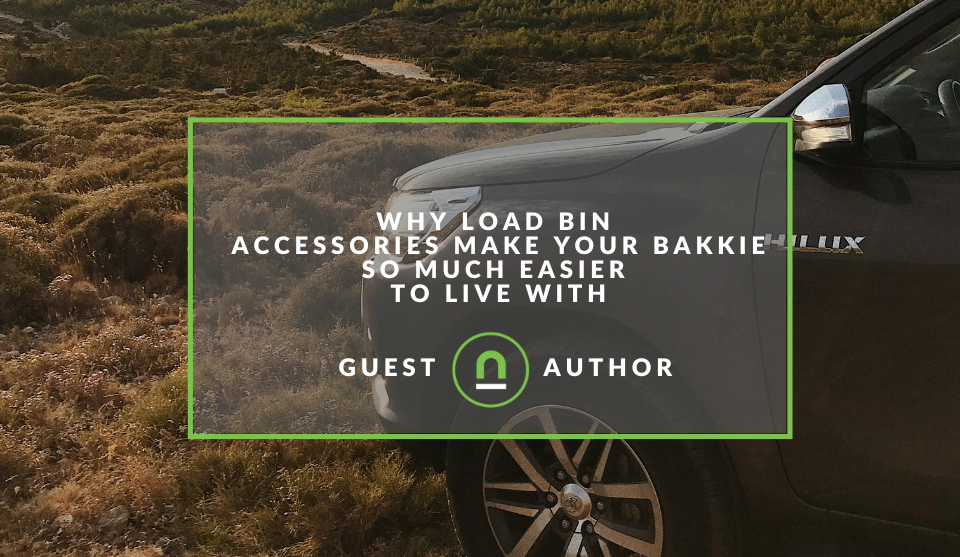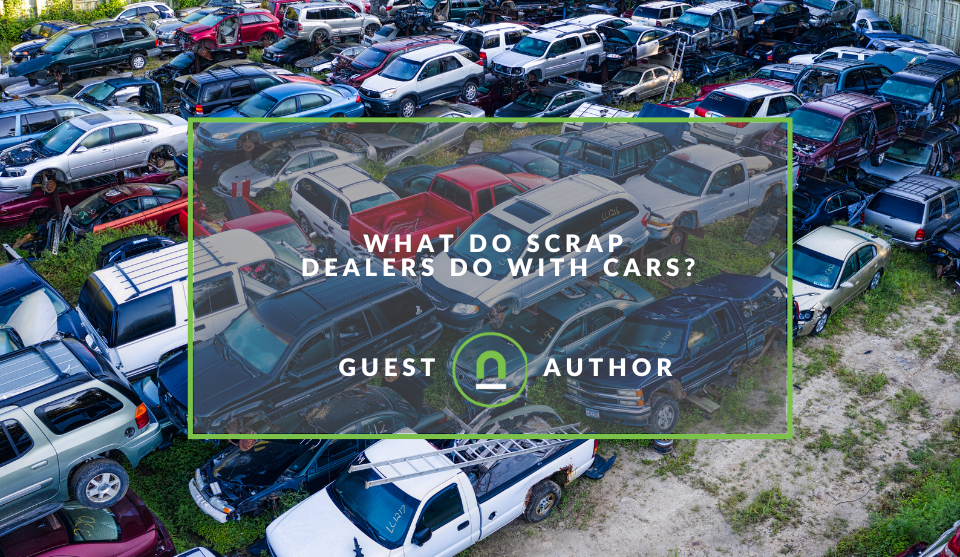Recent posts

nichemarket Advice
The South African VAT Threshold Chokehold
05 December 2025

Doctors Orders
The Difference Between SOAP Notes and DAP Notes
02 December 2025

Petrol heads
Why Load Bin Accessories Make Your Bakkie So Much Easier to Live With
26 November 2025

Alarming
What Is The Part Time Job WhatsApp Scam?
25 November 2025
Popular posts
Extravaganza
Trending Music Hashtags To Get Your Posts Noticed
24 August 2018
Geek Chic
How To Fix iPhone/iPad Only Charging In Certain Positions
05 July 2020
Extravaganza
Trending Wedding Hashtags To Get Your Posts Noticed
18 September 2018
Money Talks
How To Find Coupons & Vouchers Online In South Africa
28 March 2019
What Do Scrap Dealers Do With Cars?
01 August 2025 | 0 comments | Posted by Che Kohler in Petrol heads
When your old car reaches the end of its road-worthy life, you might wonder what happens next. Where does it go, and what becomes of all that metal, plastic, and countless components?
The answer lies in the fascinating world of automotive scrap dealing—a complex industry that transforms end-of-life vehicles into valuable resources while protecting our environment.
Ever heard the saying "One man's trash is another man's treasure?" Well, scrap yards are the living embodiment of that view.
According to a report by Coherent Market Insights, the global scrap market is worth $82 billion, which is a sizeable market, but how do they generate this type of value?
The Journey Begins: Vehicle Assessment and Documentation
When a car arrives at a salvage yard facility near you, the process starts with thorough documentation and assessment. Scrap dealers must verify ownership, check for liens, and ensure all legal requirements are met before proceeding.
They examine the vehicle to determine its condition, identifying valuable components that can be resold and assessing the overall scrap value.
The dealer creates detailed records of the vehicle, including its VIN number, make, model, year, and condition. This documentation is crucial for legal compliance and helps track the vehicle through the recycling process.
Fluid Drainage: The First Critical Step
Before any dismantling begins, scrap dealers must safely remove all fluids from the vehicle. This environmental protection measure prevents contamination and allows for proper disposal or recycling of these materials. The fluids removed include engine oil, transmission fluid, brake fluid, power steering fluid, coolant, windshield washer fluid, and gasoline or diesel fuel.
Many of these fluids can be recycled or reprocessed for reuse. For example, used motor oil can be re-refined into new oil, and coolant can be filtered and purified for reuse.
Part Harvesting: Maximizing Value Through Reuse
One of the most profitable aspects of auto scrapping involves carefully removing and cataloging reusable parts. Experienced technicians systematically dismantle vehicles, extracting components that are still in good working condition.
High-value parts commonly salvaged include engines, transmissions, alternators, starters, air conditioning compressors, catalytic converters, airbags, electronic control modules, wheels and tires, doors, hoods, and fenders. These parts undergo inspection and testing before being cleaned, inventoried, and made available for sale to repair shops, individual mechanics, and car owners looking for affordable replacement parts. The used auto parts market represents a significant portion of the scrap dealer's revenue, often generating more income than the scrap metal value of the remaining vehicle shell.
Battery and Tire Management
Car batteries receive special attention due to their lead content and acid electrolyte. Scrap dealers typically remove batteries early in the process and sell them to specialized recycling facilities where the lead can be recovered and reused in new batteries. The plastic cases are also recycled. Tires present both challenges and opportunities. While they can't be processed as scrap metal, many dealers partner with tire recycling companies that transform old tires into rubber mulch, playground surfaces, road construction materials, or fuel for cement kilns.
Catalytic Converter Recovery
Catalytic converters deserve special mention due to their valuable precious metal content. These emissions control devices contain platinum, palladium, and rhodium—metals worth significantly more than steel or aluminum. Scrap dealers carefully remove and store catalytic converters, eventually selling them to specialized processors who extract and refine these precious metals.
The Crushing and Shredding Process
Once all valuable parts and fluids have been removed, the remaining vehicle shell—primarily composed of steel—enters the final phase of processing. The shell is typically crushed using powerful hydraulic equipment that compresses it into a compact cube or flattened shape for easier transportation.
Many larger scrap operations have on-site shredding equipment that breaks down the crushed vehicles into small pieces of mixed materials. This shredded material, known as "auto shred," contains ferrous metals (iron and steel), non-ferrous metals (aluminum, copper, brass), and small amounts of other materials.
Metal Separation and Purification
The shredded material undergoes sophisticated separation processes to isolate different types of metals. Magnetic separators remove ferrous metals, while various other technologies separate non-ferrous metals like aluminum and copper from the remaining materials.
Advanced facilities use eddy current separators, air classification systems, and even hand-sorting to achieve high purity levels in their recovered metals. This separation is crucial because different metals have different values and end uses.
Selling to Steel Mills and Metal Processors
The separated metals become raw materials for manufacturing new products. Steel recovered from cars typically goes to steel mills where it's melted down and reformed into new steel products. Remarkably, the steel in your current car likely contains recycled steel from previously scrapped vehicles.
Aluminium from cars often returns to the automotive industry for new vehicle production, as recycled aluminium requires 95% less energy to process than creating new aluminium from ore. Copper recovered from wiring and components goes to brass mills and copper refineries.
Environmental Benefits and Compliance
Modern scrap dealers operate under strict environmental regulations designed to prevent pollution and protect public health. They must properly handle hazardous materials, prevent groundwater contamination, and maintain detailed records of their operations.
The environmental benefits of auto recycling are substantial. Each recycled car saves approximately 2,500 pounds of iron ore, 1,400 pounds of coal, and 120 pounds of limestone that would otherwise be needed to produce new steel. Additionally, recycling reduces the need for mining operations and decreases energy consumption in metal production.
Economic Impact and Market Dynamics
The automotive recycling industry represents a significant economic force, supporting thousands of jobs and generating billions in revenue annually. Scrap metal prices fluctuate based on global demand, affecting how much dealers pay for end-of-life vehicles and influencing their processing priorities.
When steel prices are high, dealers focus more on maximizing the metal recovery from each vehicle. During periods of lower metal prices, they may emphasize parts sales to maintain profitability.
Technology and Innovation in Auto Scrapping
Modern scrap dealers increasingly use technology to improve efficiency and profitability. Computerized inventory systems track parts and their locations within sprawling salvage yards. Online marketplaces connect dealers with customers worldwide, expanding their potential sales reach. Some facilities use artificial intelligence and automated systems to identify valuable components more quickly and accurately. Advanced material identification technologies help separate different types of plastics and metals more effectively.
The Future of Auto Scrapping
As vehicles become more complex, incorporating advanced electronics, hybrid powertrains, and lightweight materials, scrap dealers must adapt their processes. Electric vehicle batteries require specialised handling and recycling procedures. New materials like carbon fiber present both challenges and opportunities for future recycling operations. The industry continues evolving to handle these changes while maintaining its core mission of resource recovery and environmental protection.
Scrap Dealers Are Part Of A Vehicle's Lifecycle
Scrap dealers play a vital role in the circular economy, transforming end-of-life vehicles into valuable resources while protecting the environment. Through careful dismantling, part recovery, fluid management, and metal recycling, they ensure that roughly 80% of each scrapped vehicle returns to productive use.
This complex process, from initial assessment to final metal delivery, demonstrates how the automotive recycling industry has evolved into a sophisticated operation that balances profitability with environmental responsibility. The next time you see an old car being towed to a scrap yard, you'll know it's beginning a journey that will give new life to its components and materials in countless future products.
Understanding what scrap dealers do with cars helps us appreciate this often-overlooked industry that quietly contributes to sustainability, resource conservation, and economic activity in communities worldwide.
Are you looking to promote your business?
Automotive businesses can create a free business listing on nichemarket. The more information you provide about your business, the easier it will be for your customers to find you online.
Registering with nichemarket is easy; all you will need to do is head over to our sign-up form and follow the instructions. If you require a more detailed guide on how to create your profile or your listing, then we highly recommend you check out the following articles.
Recommended reading
If you enjoyed this post and have time to spare, why not check out these related posts and dive deeper into the rabbit hole of vehicle management?
- The Most Frequently Stolen or Hijacked Cars In South Africa
- Get Instant Quotes & Sell Your Car Online In South Africa
- How Much Does A Personalised Number Plate Cost In South Africa
- How To Save Money To Buy Your Dream Car
- 7 Documents You Need When Selling A Car
- 3 Best Road Trips In South Africa
- 7 Ways To Choose The Best Car Roof Rack
- 5 Car Preparation Tips for a Long Road Trip
Tags: Scrap Yard, Vehicle Salvage
You might also like
The Difference Between SOAP Notes and DAP Notes
02 December 2025
Posted by Che Kohler in Doctors Orders
A look at SOAP format, which remains the classic choice for healthcare professionals, while DAP notes offer more flexibility for mental health docume...
Read more48 Black Friday Software Deals 2025
14 November 2025
Posted by Che Kohler in Shopaholics
We put together a comprehensive list of software and digital business offering Black Friday discounts on their subscriptions or digital products this...
Read more{{comment.sUserName}}
{{comment.iDayLastEdit}} day ago
{{comment.iDayLastEdit}} days ago
 {{blogcategory.sCategoryName}}
{{blogcategory.sCategoryName}}

